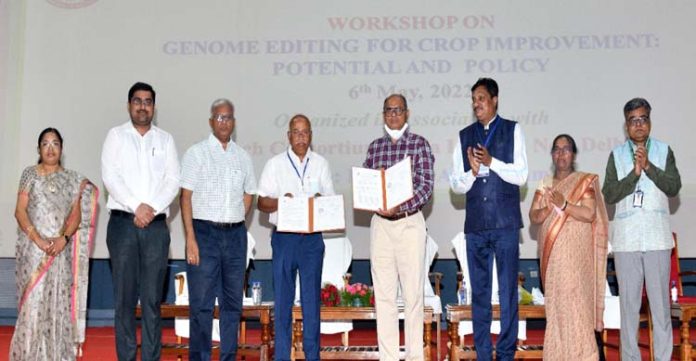Professor Jayashankar Telangana State Agricultural University (PJTSAU) and the Biotech Consortium India Limited (BCIL), New Delhi has jointly organized a one day workshop on “Genome Editing for Crop Improvement: Potential and Policy” here on Friday at the university auditorium in Rajendranagar.
Special Commissioner of Department of Agriculture, Telangana K.Hanumanthu attended as chief guest for the inaugural program and spoke on the occasion. He held that before implementing the new technologies in the farm fields, there is a need to clear the concerns of the farmers first. “It is very essential to adopt improved technologies to ensure nutritional and food security for the growing population, ” he said, adding that “agriculture is a potential area to demonstrate and implement genome editing technology in the agriculture sector. At the same time, there is a need to educate and dispel the negative apprehensions and concerns of the farmers about the technology.”
While presiding over the program, Vice Chancellor, PJTSAU Dr.V.Praveen Rao, said that “The new agricultural technologies, that have the uniqueness, must be made available to the common people and it ensures the enhancement of the farmer’s income.” He advised the BCIL to put efforts to incorporate genome technology education in the middle school level curriculum.
Dr.RM. Sundaram, the Director, Indian Institute of Rice Research has delivered a Keynote address on genome editing.
The main advantage of using genome editing, he said, is that it can accelerate the delivery of improved crop varieties. Genome editing technology is relatively inexpensive to implement and has widespread accessibility in both private and public sector research institutions and organizations.
“It can be used in almost all crop plants, for which partial or complete genome sequence is available and is being applied to more than 40 crops across 25 countries, mostly addressing various agronomic important traits like, yield improvement, nutritional enhancement food and feed quality, biotic and a biotic stress tolerance etc, in the realm of depleting natural resources and a fast changing climate,” he contended.
“The global CRISPR technology market is booming and is projected to increase from US $ 1,064.91 million in 2021 to US$1,327.27 million in 2022 at a compound annual growth rate (CAGR) of 24.6%,” he said attributing to CRISPR Technology Global Market Report 2022.
In the Indian context, the technology can play a significant role in enhancing the production and productivity of pulses and oilseed crops to minimize the dependency on import. India imported edible oils worth Rs. 1.17 lakh crore in 2020-21 and more than one lakh crore during the first nine months for FY 2021-22. Genome editing needs to be fully exploited for enhancing the productivity of oilseed and pulse crops, and also to improve the protein and oil quality and quantity,” felt Dr.RM. Sundaram.
Dr Vibha Ahuja, Chief General Manager, BCIL, New Delhi explained worldwide scenarios about the application of the genome editing technology in agriculture and other sectors. “China, USA has become leaders in the utilization of genome technology in the world. India has also initiated several guidelines to encourage genome editing technology,” she added.
The event witnessed a myriad number of students and representatives from seed companies, faculty members, scientists and eminent scientists.
Meanwhile, PJTSAU had entered into a Memorandum of Understanding (MoU) with Rasi Seeds, Tamil Nadu. The MoU intends to collaborate in Research and Development of mutual interest on breeding, molecular breeding, bio technological approaches, crop management, nanotechnology & agricultural engineering technologies to benefit the farming community. Dr Sudheer Kumar, Registrar PJTSAU and Dr. Ramaswami, Chairman, Rasi seeds were exchanged in the MoU in the presence of VC Praveen Rao.


